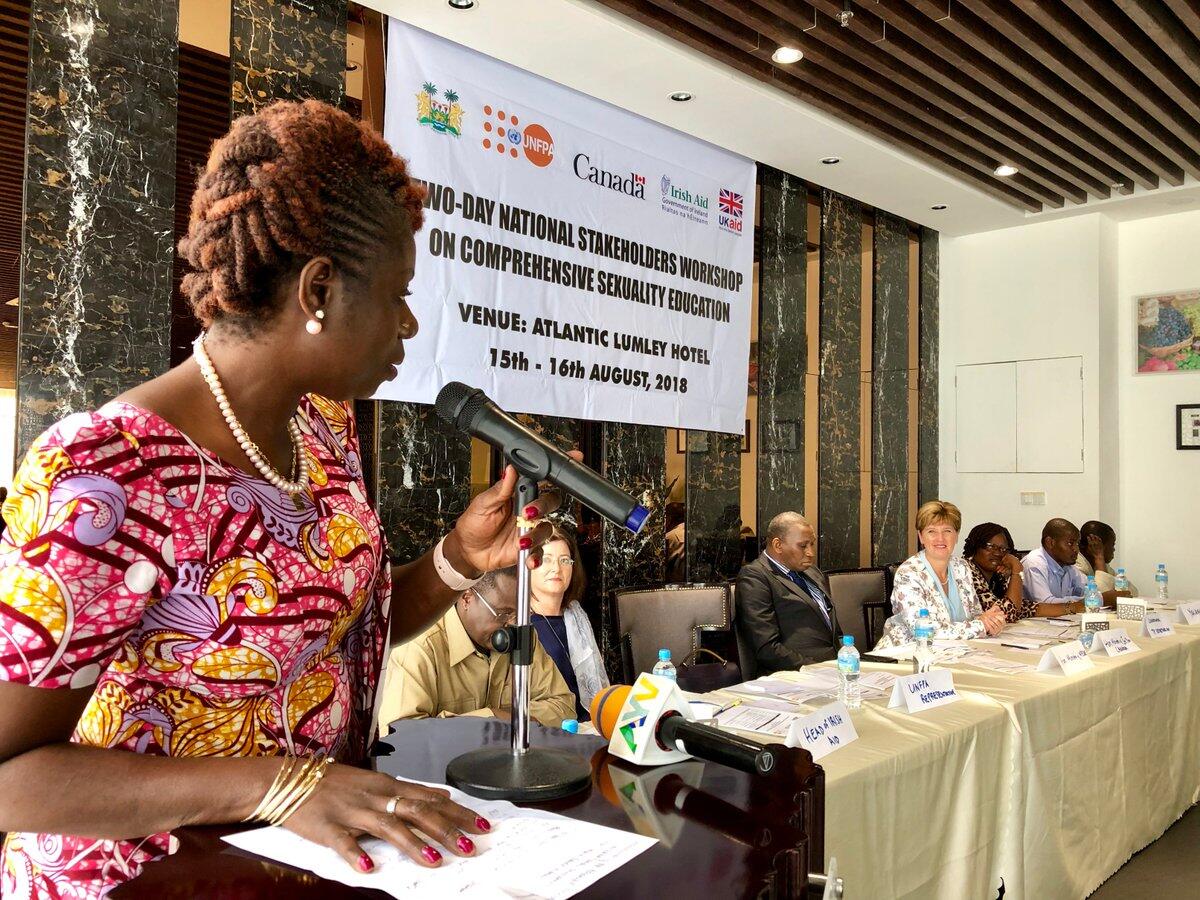FREETOWN, Sierra Leone, 17 August 2018 – A two-day national stakeholders workshop took place to discuss the way forward for the implementation of comprehensive sexuality education in Sierra Leone. The national workshop, which brought together key stakeholders from across the country, was organized by the Ministry of Basic and Senior Secondary Education and UNFPA, the United Nations sexual and reproductive health agency. Keynote speakers included the Minister of Basic and Senior Secondary School, Mr. Alpha Timbo and the Canadian Minister of International Development, Ms. Marie-Claude Bibeau.
Comprehensive sexuality education is a curriculum-based method of teaching and learning about the different aspects of sexuality. It equips young people with scientifically accurate information about sexual and reproductive health. It goes beyond information, to encourage confidence, improved communication skills and critical thinking skills to make conscious, healthy and respectful decisions about relationships and accessing health services. Comprehensive sexuality education is gender-sensitive and firmly grounded in human rights. It empowers children, adolescents and young people to achieve their right to education about their bodies, relationships and sexuality.
Delivering the keynote address, Minister of Basic and Senior Secondary Education, Mr. Alpha Timbo stated, “With proper implementation, comprehensive sexuality education has been proven to reduce dropout rates by helping to reduce adolescent pregnancy.” He added, “The purpose of comprehensive sexuality education is not to remove all our cultural values in our societies but to merely come together and think of how we can incorporate comprehensive sexuality education within these values that we hold so dearly.”
The main objectives of the workshop included, orienting national stakeholders on comprehensive sexuality education; informing stakeholders about the latest evidence and best practices in comprehensive sexuality education; and lastly, establishing a technical working group to oversee the process of developing comprehensive sexuality education curriculum, training materials, advocacy and training.
Attending the workshop as a special guest speaker, Canadian Minister for International Development, Marie-Claude Bibeau said, “The Canadian Government continues to be at the forefront to end the practice [of child marriage]. “Comprehensive sexuality education will give girls the knowledge they need to decide when and whom they marry,” she added.
Global and regional momentum around comprehensive sexuality education has resulted in increased political commitment. The Programme of Action of the 1994 International Conference on Population and Development calls on governments to provide sexuality education to all manner of people including adolescents, specifying that such education should take place both in schools and at the community level, begin as early as possible, foster mature decision-making and aim to eliminate gender inequality.
Working in partnership with other UN agencies, UNFPA has contributed to the “International Technical Guidance on Sexuality Education” developed jointly with UNESCO, UNICEF, UNAIDS, UN Women and WHO. The evidence informed document provides countries with guidelines on how to adapt international best practice on the key concepts, topics and learning objectives for comprehensive sexuality education. UNFPA is also leading on development of the ‘International Technical Guidance on Out of School Comprehensive Sexuality Education’.
The African Union acknowledges the importance of sexuality education and services for young people as enshrined in the Maputo Protocol and the African Youth Charter. In 2015, the African Union recognized comprehensive, age-appropriate sexuality education as one of five key recommendations to fast track the HIV response among young women and girls in Africa.
Sierra Leone has also made international commitments to the introduction of quality sexuality education at the Family Planning 2020 Summit in 2012. This commitment is reflected in both the Education Sector Plan (2018 - 2020) and the revised National Strategy for the Reduction of Adolescent Pregnancy and Child Marriage (2018 – 2022).
Delivering her remarks, Dr. Kim Eva Dickson, UNFPA Sierra Leone country representative said, “International evidence time and again tells us that comprehensive sexuality education is most effective when it is executed well and delivered alongside access to quality youth friendly adolescent health services, and when parents and community stakeholders are engaged to support adolescents to access sexual reproductive health information and services.” Dr. Dickson stated that UNFPA in Sierra Leone will continue to provide continued technical assistance to the Ministry of Basic and Senior Secondary Education to ensure that a quality comprehensive sexuality education curriculum is designed, that teachers are adequately trained and that school environments are safe. “UNFPA is committed to supporting the Government of Sierra Leone to build the national evidence base on comprehensive sexuality education as we move forward,” she added.
The workshop concluded with participants in agreement on key strategic actions pertaining to community advocacy, curriculum revision and teacher training which will be presented as recommendations to the Minister of Basic and Senior Secondary Education.
*****
For more information contact:
Angelique Reid, UNFPA Communication Specialist
Tel: +232 78340044
Email: areid@unfpa.org


